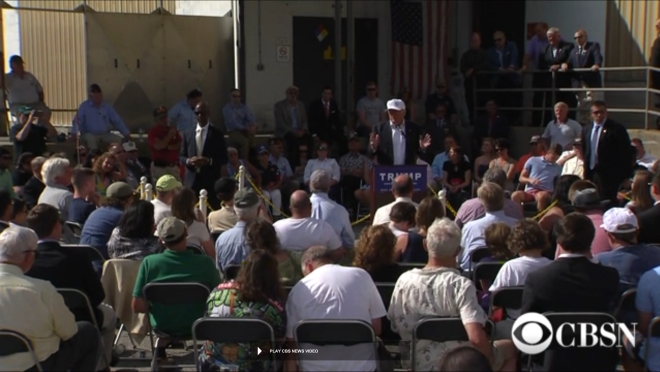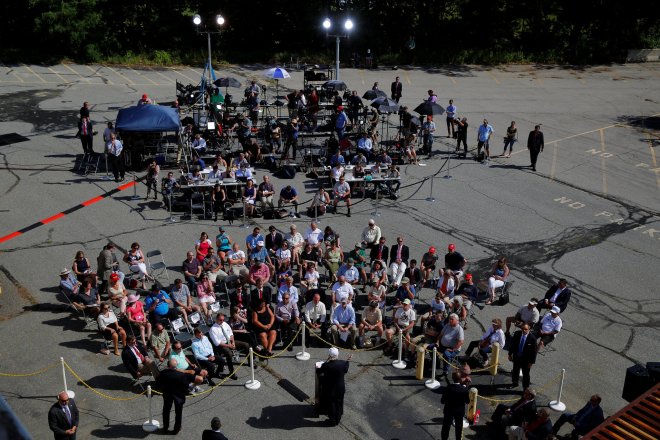 Donald Trump is surrounded by – and apparently admires and respects – generals. His chief of staff, John Kelly, is a retired four-star Marine general. His Secretary of Defense, James Mattis, is also a retired four-star Marine general. His national security adviser, H. R. McMaster, is an active three-star Army general. And then there’s the Chairman of the Joint Chiefs of Staff, General Joseph Dunford, who is also a four-star Marine general. He could walk out of any door in the Oval Office and would trip over a general. A couple of them – McMaster and Mattis – are known as intellectuals and students of history.
Donald Trump is surrounded by – and apparently admires and respects – generals. His chief of staff, John Kelly, is a retired four-star Marine general. His Secretary of Defense, James Mattis, is also a retired four-star Marine general. His national security adviser, H. R. McMaster, is an active three-star Army general. And then there’s the Chairman of the Joint Chiefs of Staff, General Joseph Dunford, who is also a four-star Marine general. He could walk out of any door in the Oval Office and would trip over a general. A couple of them – McMaster and Mattis – are known as intellectuals and students of history.
Since Mr. Trump seems to have some sort of soft spot for fascists, white nationalists and neo-Nazis, he should ask any of those generals about Operation Barbarossa and how it worked out for Germany’s Nazis. Today, with the shit-canning of the lumpy, oatmeal-ish, slovenly Steve Bannon, Trump is making the same strategic blunder. Let’s call it Operation Bannarossa.
Now, please don’t think for a second that 1) I’m unhappy about Mr. Bannon’s departure or 2) that I feel sorry for Mr. Trump that he’s made a decision of such epic stupidity that it compares to the decision that ultimately caused the death of millions, caused Germany to lose the war and led to the division of Europe for almost half a century. I am, actually, almost gleeful (more on that below). Instead, I’m writing today because this marks what may well be the beginning of the end of the Trump presidency.
For those too lazy to click on the link or who are too far removed from their high school history class, Operation Barbarossa was the name for Germany’s invasion of the Soviet Union in June of 1941. It was – and remains – the largest military operation in history, involving 4 million men, an 1,800-mile front, 600,000 motor vehicles and 600,000 to 700,000 horses for non-combat operations. It also opened a second front in Germany’s war, one that ultimately sucked dry the German war machine. The horrific and protracted fighting lasted for four years and directly contributed to the ability of the Allies on the western front to reclaim the countries of western Europe that had been conquered earlier in the war.
There’s some debate among students of history whether Germany had to invade the western part of the Soviet Union as a source of manpower and natural resources, but there’s little debate – at least that I can find – that the actual invasion was incredibly stupid. It was based on overly optimistic assessments of German military effectiveness, the weakness of the Soviet military and the strength of its political leadership. It ignored the lessons learned by one of the great tacticians of all time, Napoleon Bonaparte, who invaded Russia in 1812 with an army of 422,000 soldiers and came home in 1813 with 10,000 men marching behind him (see the graphic below).

What Trump has done today is pretty much the same thing. By firing Steve, he has opened up a new front in his war with…pretty much everyone. Yesterday, his strategic map looked like this:

In the first seven months of his administration, Mr. Trump managed to go to war with almost everyone who wasn’t in his “base.” Whether deliberately or through ineptitude (my leading theory) he has managed to alienate both those he might have persuaded (Independents, moderate Democrats, the intelligence community) and those he should have been able to hold close like Senate Republicans, his only reliable support has been those loyal supporters on the right who – for a variety of reasons – responded to his populist/nationalist message. There are enough of these people to keep Mr. Trump’s rallies full and to enforce a little discipline on Congressional Republicans who are scared that they might be primaried by unhappy Trump voters.
Today, with the launch of Operation Bannarossa, Mr. Trump’s strategic map looks like this:

With this firing, Mr. Trump has opened up another front that will, I believe, cost him a substantial part of his remaining support. He has 1) pissed off and embarrassed Steve Bannon 2) freed him to “let Bannon be Bannon” 3) angered all those who think of Mr. Bannon as their guy inside this White House. High among those are the billionaire Mercer family, which has bankrolled Breitbart and Mr. Bannon and, of course, Breitbart itself. These people believe – with good reason – that they made Donald J. Trump’s unlikely victory and they can, by God, take it away.
Lest you think I’m exaggerating how this move is being perceived by Mr. Bannon’s allies, his former colleagues at Breitbart sent out a one-word Tweet upon hearing the news:

 And, lest you think I’m exaggerating the amount of effort Steve Bannon and his Breitbart colleagues poured into promoting Mr. Trump, I highly recommend the just-published Devil’s Bargain by Joshua Green that details how Bannon was pushing the Trump candidacy long before joining the campaign in August 2016. Consider, for example, Bannon’s efforts in February 2016 to convince then-Senator Jeff Sessions to endorse Trump:
And, lest you think I’m exaggerating the amount of effort Steve Bannon and his Breitbart colleagues poured into promoting Mr. Trump, I highly recommend the just-published Devil’s Bargain by Joshua Green that details how Bannon was pushing the Trump candidacy long before joining the campaign in August 2016. Consider, for example, Bannon’s efforts in February 2016 to convince then-Senator Jeff Sessions to endorse Trump:
As Joshua Green wrote in “Devil’s Bargain,” Sessions, then a senator from Alabama, was unsure if Trump could secure the Republican nomination, and knew that being the first senator to endorse Trump could further curtail his political future if Trump, the Republican frontrunner at the time, lost.
The day before Sessions endorsed Trump at a Madison, Alabama rally in February 2016, then-Breitbart News chairman Bannon told Sessions that it was “do or die” time and that “this is the moment” to endorse.
“Trump is a great advocate for our ideas,” Sessions told Bannon. “But can he win?”
“100%,” Bannon said. “If he can stick to your message and personify this stuff, there’s not a doubt in my mind.”
Sessions then noted that the GOP already denied him the chairmanship of the Budget Committee, and that “if I do this endorsement and it doesn’t work, it’s the end of my career in the Republican Party.”
“It’s do or die,” Bannon replied. “This is it. This is the moment.”
That moment was just days before what are known as the “SEC” primaries — a series of primary contests concentrated throughout the South. Bannon told Sessions that his endorsement could push Trump over the hump in many of those contests and essentially seal up the Republican nomination.
“Okay, I’m all-in,” Sessions said. “But if he doesn’t win, it’s over for me.”
And, lest you think I’m exaggerating the importance of Breitbart in setting the agenda of American conservatives and in controlling what they read, watch and listen to, I refer you to a recent study by a Harvard/MIT team which reached the following conclusion:
Our own study of over 1.25 million stories published online between April 1, 2015 and Election Day shows that a right-wing media network anchored around Breitbart developed as a distinct and insulated media system, using social media as a backbone to transmit a hyper-partisan perspective to the world. This pro-Trump media sphere appears to have not only successfully set the agenda for the conservative media sphere, but also strongly influenced the broader media agenda, in particular coverage of Hillary Clinton.
The research team visualized Breitbart’s impact by looking at how many postings to Facebook come from the various media sources. By far, the largest star in the conservative universe – the one that bends light because of its gravitational field – is Breitbart. Bigger than Fox, bigger than the Daily Caller or any other outlet combined.
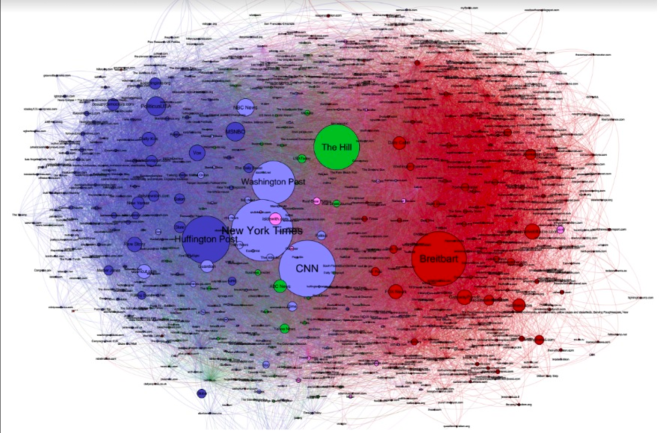
And Donald Trump just went to war with them. Good luck with that.
As an aside, if you want an in-depth look at Breitbart, I recommend this week’s New York Times magazine cover story.
Now, some will take issue with the near-glee I feel at the prospect of watching Mr. Trump’s approval ratings go into the 20s (near certain IMHO) and the steady procession of Congressional denouncements (again a near-certainty) and staff and Cabinet resignations (likely but not certain because some will have no place else to go – the spittle-chinned Stephen Miller for example – or are so thoroughly stained – I’m looking at you @kellyannepolls – that there’s no reason to leave). It is unpatriotic to root for our president to fail, they’ll argue, and in general I agree.
But, this isn’t the general case; Donald Trump is the black swan sort of case. After watching the damage he’s done to our country over the last seven months, convinced that he will never, ever, EVER change, I’m convinced that we need him to leave office as soon as possible whether through resignation, impeachment, use of the 25th Amendment or taking him up on his offer to go away for five billion dollars. We cannot survive a full term of this man.
Operation Bannarossa…may it do for Donald Trump what Operation Barbarossa did for the Nazis. Faster.
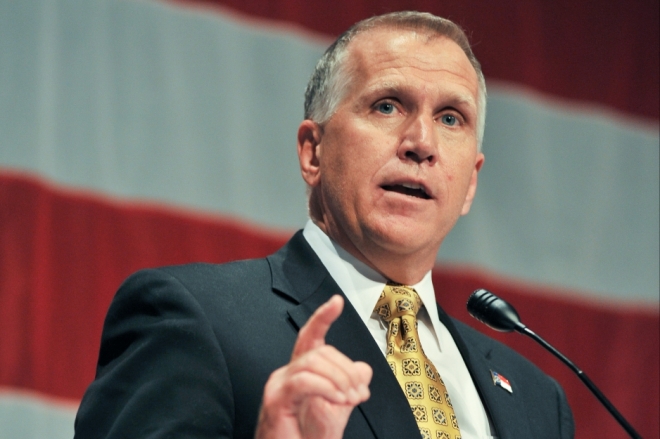

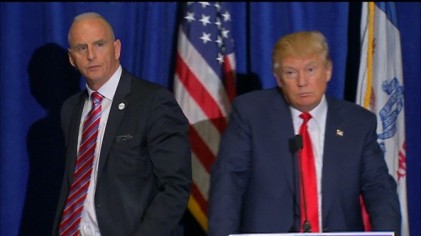 I’ll leave it to the elephants to trample the grass around the firing of FBI Director James Comey – except to agree with the obvious point that this clearly wasn’t about the Director’s handling of the Hillary Clinton e-mail issue – but I do want to call out one telling detail of yesterday’s drama: Mr. Trump sent his longtime bodyguard – Keith Schiller – to hand carry the letter of dismissal to Director Comey’s office. That wasn’t an accident and reveals the petty cruelty and arrogance of Mr. Trump.
I’ll leave it to the elephants to trample the grass around the firing of FBI Director James Comey – except to agree with the obvious point that this clearly wasn’t about the Director’s handling of the Hillary Clinton e-mail issue – but I do want to call out one telling detail of yesterday’s drama: Mr. Trump sent his longtime bodyguard – Keith Schiller – to hand carry the letter of dismissal to Director Comey’s office. That wasn’t an accident and reveals the petty cruelty and arrogance of Mr. Trump. Word this evening is that the House Republican leadership has set a vote for tomorrow on the latest version of “Repeal and Replace.” Insiders and observers are saying that this is a sign Speaker Ryan and his whips have found the requisite number of “yeas” to get the bill out of the House and on to the Senate.
Word this evening is that the House Republican leadership has set a vote for tomorrow on the latest version of “Repeal and Replace.” Insiders and observers are saying that this is a sign Speaker Ryan and his whips have found the requisite number of “yeas” to get the bill out of the House and on to the Senate.

 “What would Andrew Shepherd do?”
“What would Andrew Shepherd do?”




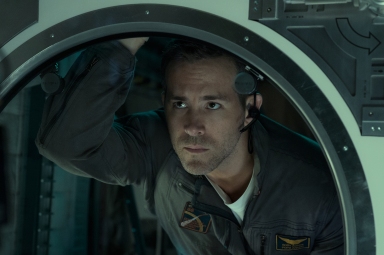 Continuing my theme of doing things other than fret about Donald Trump, I have spent some time fretting about other existential threats to humanity. So, that’s healthy.
Continuing my theme of doing things other than fret about Donald Trump, I have spent some time fretting about other existential threats to humanity. So, that’s healthy. As I was driving home from the theater, it occurred to me that the movie was actually a commentary on the how we – not you or me, but some VERY smart people – are approaching the field of AI. As near as I can tell, we are using the same shitty scientific methods – the ones that would make any life science researcher cringe – to develop this technology. We have researchers all across the world laboring in secret, scientists who are less objective researchers and more would-be parents who are enraptured with the idea of
As I was driving home from the theater, it occurred to me that the movie was actually a commentary on the how we – not you or me, but some VERY smart people – are approaching the field of AI. As near as I can tell, we are using the same shitty scientific methods – the ones that would make any life science researcher cringe – to develop this technology. We have researchers all across the world laboring in secret, scientists who are less objective researchers and more would-be parents who are enraptured with the idea of  As I watched the dramatic collapse of Trumpcare today, I was reminded that Minnesotans have seen this Happy Gilmoresque movie before: Before there was “Trump: The President” there was “Ventura: The Governor.”
As I watched the dramatic collapse of Trumpcare today, I was reminded that Minnesotans have seen this Happy Gilmoresque movie before: Before there was “Trump: The President” there was “Ventura: The Governor.”


 I’ve been reading three memoirs from the South that help explain Trump voters. Hillbilly Elegy, by J. D. Vance (he’s been on every interview show there is lately), Dimestore, by Lee Smith, and Finding Grace, by Donna VanLiere. All three talk about small towns withering in the South and about what people who stay are like and what people who get out are like. A common theme is that, as the world and the economy change and jobs disappear, some people change with the flow and some stand pat and drown. Many who are overwhelmed by change lack agency — they feel as if the world is doing something to them, and as if they have no role to play in adapting or changing. And many of them are mad. At the world. At “them.” Whoever “them” is. In Vance’s book, a guy who lost his job by drinking too much blames his bosses. Vance says having someone to provide kids growing up with stability (for him, grandparents) and a view of larger possibilities can make all the difference between becoming someone who feels angry and helpless and someone who feels he or she can rise higher than their immediate surroundings.
I’ve been reading three memoirs from the South that help explain Trump voters. Hillbilly Elegy, by J. D. Vance (he’s been on every interview show there is lately), Dimestore, by Lee Smith, and Finding Grace, by Donna VanLiere. All three talk about small towns withering in the South and about what people who stay are like and what people who get out are like. A common theme is that, as the world and the economy change and jobs disappear, some people change with the flow and some stand pat and drown. Many who are overwhelmed by change lack agency — they feel as if the world is doing something to them, and as if they have no role to play in adapting or changing. And many of them are mad. At the world. At “them.” Whoever “them” is. In Vance’s book, a guy who lost his job by drinking too much blames his bosses. Vance says having someone to provide kids growing up with stability (for him, grandparents) and a view of larger possibilities can make all the difference between becoming someone who feels angry and helpless and someone who feels he or she can rise higher than their immediate surroundings.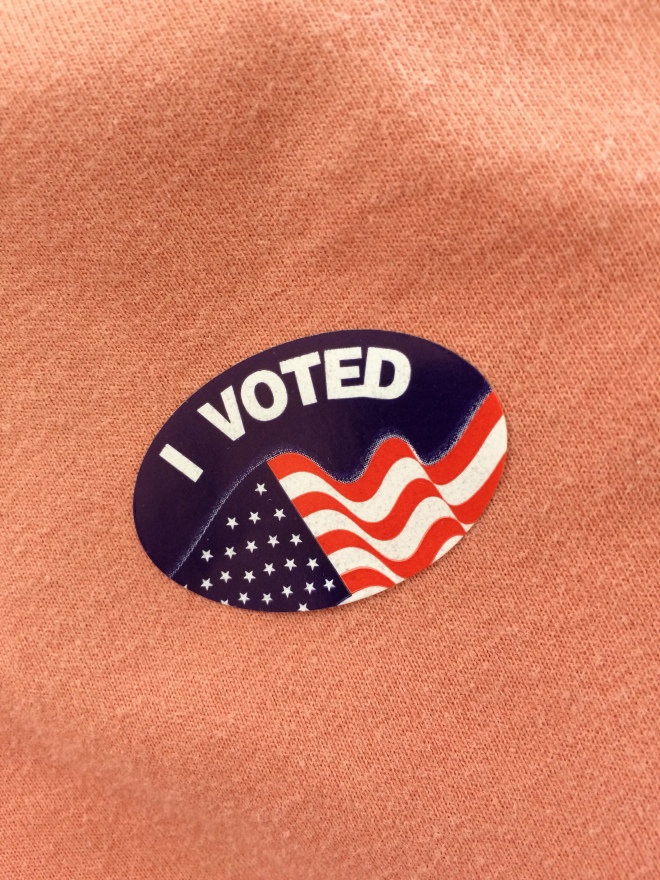 Our country has flaws. Disparity of rich and poor. Gross overconsumption of the planet’s resources. Poor education and a paucity of hope for too many. A system designed by those who already have the most to assure they get more. And our election system is far from perfect. Voter suppression. Hanging chads. Too much influence by the wealthiest. Gerrymandered districts that permit little challenge to incumbents.
Our country has flaws. Disparity of rich and poor. Gross overconsumption of the planet’s resources. Poor education and a paucity of hope for too many. A system designed by those who already have the most to assure they get more. And our election system is far from perfect. Voter suppression. Hanging chads. Too much influence by the wealthiest. Gerrymandered districts that permit little challenge to incumbents.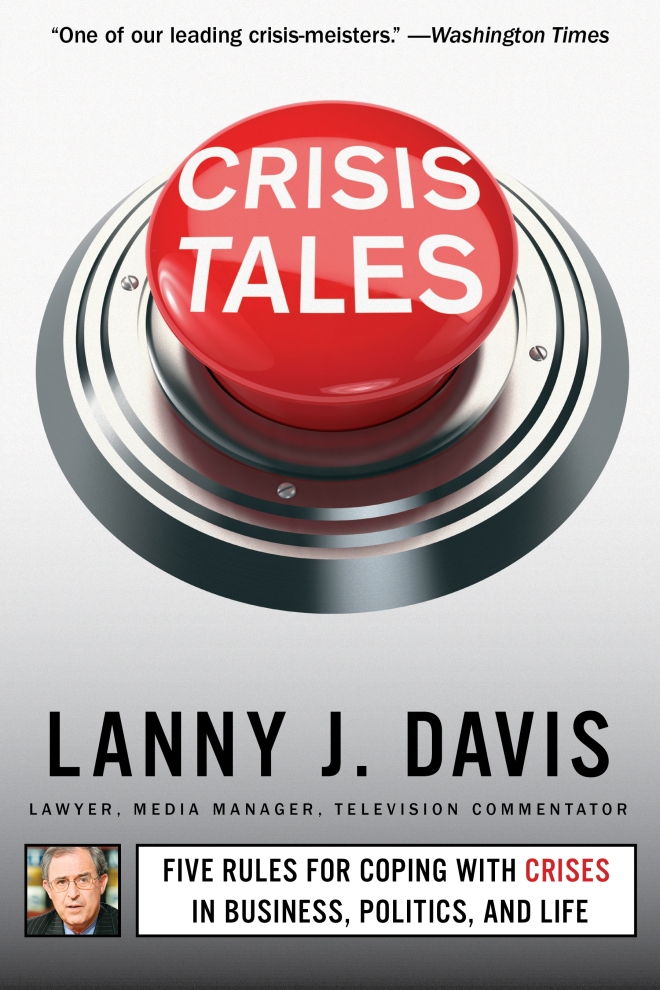
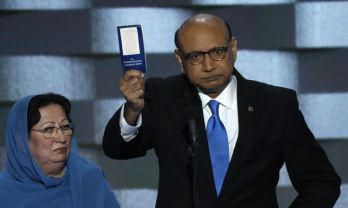 I spent 20 minutes today on the Massachusetts Turnpike with tears streaming down face.
I spent 20 minutes today on the Massachusetts Turnpike with tears streaming down face.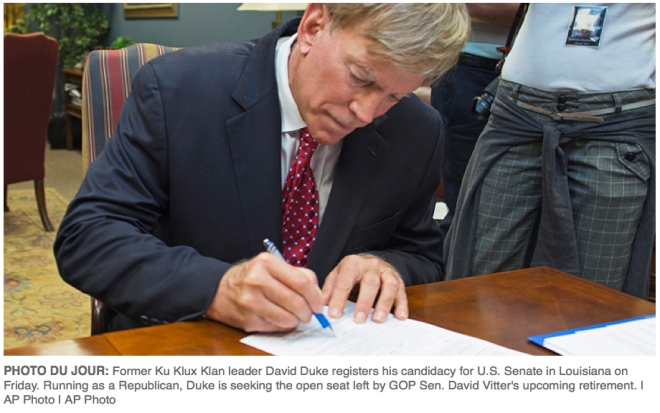


 The foreign policy world is abuzz today about the latest
The foreign policy world is abuzz today about the latest 
 Parsing the various ways that “establishment” Republicans support their presumptive presidential candidate is a wonderful exercise in linguistics. You can tell that most of them are using talking points that have been honed to within a micron of their rhetorical content. Even the simple word “support” is subject to a range of definitions that have come into play only in the last several months. To some, it means voting for, endorsing, campaigning for. Some say their support means voting for only. Some have yet to tell us what their support means.
Parsing the various ways that “establishment” Republicans support their presumptive presidential candidate is a wonderful exercise in linguistics. You can tell that most of them are using talking points that have been honed to within a micron of their rhetorical content. Even the simple word “support” is subject to a range of definitions that have come into play only in the last several months. To some, it means voting for, endorsing, campaigning for. Some say their support means voting for only. Some have yet to tell us what their support means.